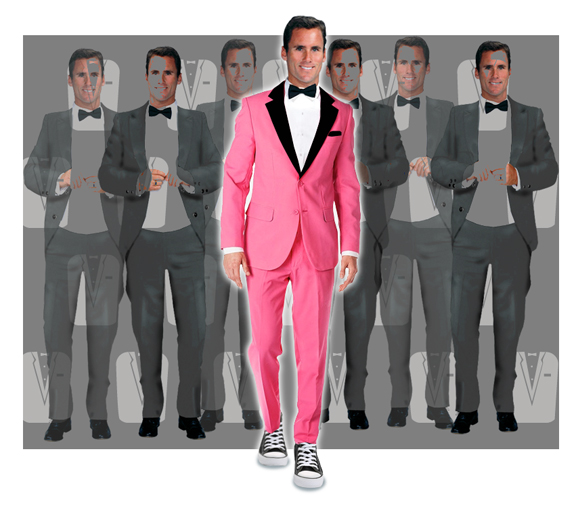 Remember me? Remember me! The punctuation on those two words
makes all the difference, doesn’t it? If I use a question mark, I am asking you
a question, as if I am not sure if you recall who I am. However, by using an
exclamation mark, I am declaring that you will never forget me.
Remember me? Remember me! The punctuation on those two words
makes all the difference, doesn’t it? If I use a question mark, I am asking you
a question, as if I am not sure if you recall who I am. However, by using an
exclamation mark, I am declaring that you will never forget me.
Now let’s apply that to your marketing. How memorable is
your marketing? Are you asking (hoping) if customers remember you or are you so
bold with your marketing that it evokes the memory of your brand every time
they encounter it? Marketing is not a timid discipline. It is meant to make you
stand out, not blend in. It is the guy who shows up for the prom wearing the
hot pink tuxedo with high top sneakers, not the gray suit and black patent
leather shoes.
Does marketing have to be in your face to be effective? No,
not necessarily. However, let’s realize that the most audacious marketing
campaigns are very memorable simply because they are outlandish. But to be
effective, marketing has to emphasize a distinction between you and your
competition. Can just any difference between you and them make an impact in
your marketing? No. The key to making your marketing work is to find the
feature in your brand that is not only different from your competition, but,
more importantly, is noteworthy with your customers. If I am manufacturing garden hoses and I say
my hose is green because my competition is producing black hoses, it is not an
effective marketing distinction unless my customers prefer green over black
hoses. However, if by saying they are green and I also mean they are
eco-friendly because they use less water without reducing the water pressure
when compared to my competitor’s product, I have a very good marketing
distinction that will likely resonate with my customers.
Distinction is one thing, making that difference memorable
is another. In marketing, creating a brand is significant to memory. What makes
a good brand? An eye-catching visual; a short, easy-to-remember name; a catchy
tagline that puts an exclamation point on the key difference between you and
your competition; and repetition. Don’t forget that last point. There have been
many studies on memory. You may have heard that you need to hear something at
least seven times before your brain will commit it to long-term memory. Other
studies have suggested it may take many more than seven times for an idea to
stick with us. One of the classic studies on memory was conducted by Hermann Ebbinghaus in 1885. In his
book, Memory. A Contribution to
Experimental Psychology, Ebbinghaus explained how we very quickly forget
something when we experience it for the first time. Typically within 20 minutes
we have forgotten to the point we cannot repeat a simple phrase we have heard –
which he called the Forgetting Curve. However, when the same experience is
repeated, our ability to recall it extends the time before we cannot remember
the phrase. He called this the Memory Curve. Ebbinghaus also found that when a
series of words or ideas were being memorized, the final point was the easiest
to remember. He called his experiment the Serial Position Effect and the
ability to recall the last thing heard, the Recency Effect. What does this have
to do with helping your customers remember your brand? The words you use to
describe your brand are more memorable when they are the last phrase that is
used in your marketing campaign. It becomes the exclamation point to your
marketing efforts. Going back to our green hose scenario, here are two taglines
that say the same thing with words positioned differently in each statement.
- Save Water with Green Hoses
- Green Hoses Save Water
What is the most important phrase for the customer to
remember, the name of the product or its best distinct feature? Whatever is
most important, making it the last thing the customer experiences in your
marketing promotions will help it stick with them.
Remember me? Remember me! Make sure your brand is memorable
with your customers. Your marketing should be helping you put the exclamation
point, not question marks, in the minds of your customers.